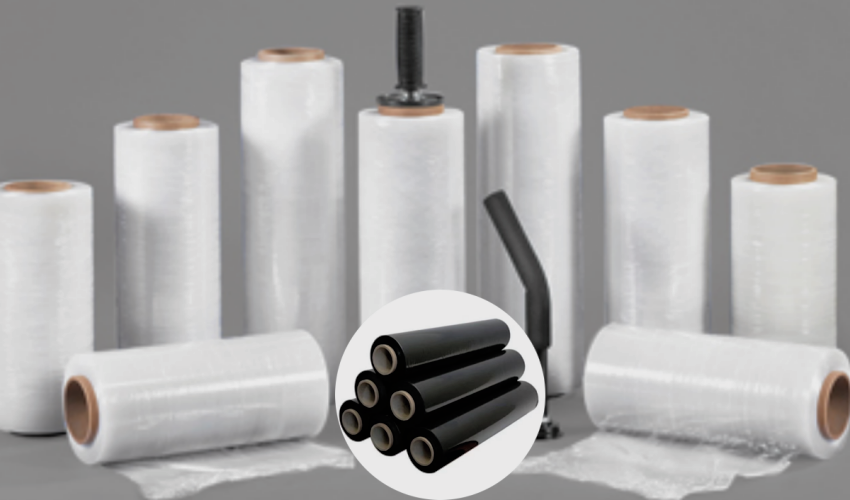
As global awareness of environmental issues rises, the need to reduce plastic usage in packaging has become more urgent than ever. Traditional pallet wraps, commonly made from single-use plastics, contribute significantly to plastic waste, often ending up in landfills or polluting ecosystems. These wraps also rely on petroleum-based materials, further adding to carbon emissions during production and disposal. For businesses focused on sustainability, exploring pallet wrap alternatives presents an effective solution for minimizing environmental impact. Pre-stretch film, for instance, offers a more efficient option by using less material while still providing strong load stability. Pallet wrap alternatives offer a range of eco-friendly options designed to secure loads effectively while supporting green practices. By transitioning to reusable, recyclable, or biodegradable materials, companies can make a positive impact on the planet while maintaining efficient logistics.
The shift toward sustainable packaging is essential for companies aiming to reduce their environmental footprint. Switching to pallet wrap alternatives provides significant benefits for both businesses and the planet. These alternatives to traditional plastic pallet wraps are crafted with materials that are either biodegradable, recyclable, or reusable, supporting environmentally friendly practices in logistics and storage.
Switching to eco-friendly pallet wraps offers a range of advantages:
A closed-loop supply chain aims to eliminate waste by reusing materials, thereby supporting sustainability. Pallet wrap alternatives play a crucial role in this approach:
Switching to eco-friendly alternatives aligns with the growing demand for sustainability in business practices, helping companies reduce waste, lower costs, and support a more environmentally responsible supply chain model.
Switching to pallet wrap alternatives offers both financial and environmental benefits, making it a practical choice for companies aiming to cut costs and reduce their ecological footprint. While some sustainable pallet wrapping alternatives might have a higher initial cost compared to traditional wraps, their long-term value often makes them a more economical option. Here’s an overview of how these alternatives can provide both cost and sustainability advantages.
Many pallet wrap alternatives are designed to be reused multiple times, which leads to significant long-term savings despite a potentially higher initial investment. This cost efficiency becomes clear over time, especially for businesses with high-volume shipping needs.
Pallet wrap alternatives often utilize materials that are either reusable or recyclable, directly addressing both cost and sustainability goals by minimizing waste and reordering needs.
The application of pallet wrap alternatives often allows for faster and more efficient wrapping, saving time and reducing labor costs in the packing process.
By focusing on pallet wrap alternatives, companies can enjoy both cost efficiency and sustainable benefits, aligning with environmentally responsible practices while lowering their operational expenses over time.
Transitioning to pallet wrap alternatives that avoid plastic use is an effective way for businesses to reduce their environmental impact while maintaining secure packaging solutions. These alternatives focus on using reusable and recyclable options that help minimize dependence on single-use plastics, aligning with sustainability goals and enhancing operational efficiency. By exploring plastic-free materials and innovative solutions, companies can achieve load stability and product protection without compromising environmental values.
Many pallet wrap alternatives offer durable, reusable solutions designed for multiple applications, which translates into both economic and environmental benefits.
Choosing pallet wrap alternatives that are plastic-free supports a variety of sustainability goals, from reducing landfill waste to lowering carbon emissions.
For businesses that require secure load stabilization without plastic, there are several effective options available, including pallet bands, lids, and straps. These solutions provide reliable stability while aligning with plastic-free principles.
By focusing on pallet wrap alternatives that eliminate plastic, businesses can achieve a balance between load stability and sustainability, reducing their environmental footprint while maintaining reliable packaging standards.
The search for eco-friendly pallet wrap alternatives has led to innovative options that rely on natural, biodegradable materials rather than traditional plastic. These alternatives prioritize sustainability and often leverage renewable resources, helping companies reduce plastic waste and promote green practices. Many of these materials break down naturally or can be recycled, offering a significant environmental benefit over single-use plastic wraps.
A range of eco-friendly materials now serve as practical pallet wrap alternatives, each offering specific benefits and reducing reliance on plastic.
Switching to eco-friendly pallet wrap alternatives has several advantages for businesses, allowing them to meet both practical and environmental goals.
Eco-friendly pallet wrap alternatives align with broader green practices by minimizing the environmental impact of shipping and packaging operations.
These eco-friendly pallet wrap alternatives provide a practical way for businesses to reduce their environmental impact while ensuring safe, effective packaging.
When it comes to securing pallet loads, pallet wrap alternatives offer effective solutions that balance load stability and environmental responsibility. Many of these alternatives, such as pallet bands, reusable wraps, and eco-friendly stretch wraps, deliver the same protective functionality as traditional plastic wraps while minimizing environmental impact. By selecting the right pallet stretch wrap alternative, businesses can ensure that their shipments remain stable during transit and storage without relying on single-use plastics.
Pallet stretch wrap alternatives provide reliable load stabilization, preventing items from shifting or becoming damaged during transportation. These alternatives are engineered to maintain high tension and offer flexibility, allowing them to secure a wide range of load types, from uniform pallets to irregular shapes.
Several pallet wrap alternatives, including pallet bands, reusable wraps, and eco-friendly stretch wraps, offer flexible, secure solutions that meet diverse packaging needs.
Eco-conscious businesses increasingly seek materials that can offer the stretch and stability of conventional wrap while minimizing environmental impact. Many pallet wrap alternatives now incorporate sustainable or biodegradable materials.
Choosing pallet stretch wrap alternatives allows businesses to prioritize both sustainability and effective load stabilization, securing their shipments with innovative, responsible materials. By considering options like the best stretch wrap, companies can achieve a balance of durability, flexibility, and environmental benefits, making it an ideal choice for those seeking both performance and responsibility in their logistics. These options represent a step toward greener logistics while offering a reliable solution for effective shipment protection.
There are several effective and eco-friendly alternatives to traditional pallet wrapping, designed to secure loads while reducing plastic waste and environmental impact. Common options include reusable pallet wraps, pallet bands, adjustable straps, and biodegradable wraps. Reusable pallet wraps are made from durable materials and can be applied multiple times, offering a cost-effective solution for companies looking to cut down on single-use plastics. Pallet bands are elastic bands that can easily be stretched around a load to provide stability; they’re simple to use, versatile, and suitable for different pallet sizes and shapes. Adjustable straps with locking mechanisms are also popular, allowing for secure load stabilization while being reusable. Finally, biodegradable wraps, are eco-friendly alternatives to traditional plastic wraps, offering the flexibility and durability needed for pallet loads but breaking down naturally over time. These alternatives not only help reduce waste but also align with environmentally conscious business practices.
While pallet wrap and cling film share some similarities, they are not the same. Both are typically made from plastic and have a stretchable quality, but their applications, thickness, and durability are different. Pallet wrap (also known as stretch wrap) is designed specifically for industrial and commercial use, often made from a tougher material like LLDPE (Linear Low-Density Polyethylene) to provide high-strength wrapping that stabilizes heavy pallet loads. It can be stretched around large objects and maintains tension to hold loads securely during transportation or storage. Cling film, on the other hand, is thinner and primarily used in food packaging or light-duty applications. It is often made to cling to smooth surfaces, making it effective for sealing food containers but not suitable for heavy-duty applications. Cling film lacks the strength and elasticity required to stabilize pallets effectively. In short, while both serve wrapping purposes, pallet wrap is built for heavy industrial use, whereas cling film is intended for lighter, more domestic applications.

My name is James Thompson, and I’m the editor of this website dedicated to Stretch Film, Pallet Wrap, and Stretch Wrap products.
My passion for packaging began when I noticed the challenges companies face in securing their products efficiently for transportation and storage. This inspired me to delve deep into the world of stretch films and pallet wraps, exploring the latest technologies and best practices.
I aim to provide valuable insights, practical tips, and up-to-date industry trends to assist you in making informed decisions. Whether you’re a small business owner or part of a large corporation, my goal is to support you in optimizing your operations and ensuring your products reach their destination safely.
Thank you for visiting, and I look forward to accompanying you on your journey toward better packaging solutions.
Comments are closed